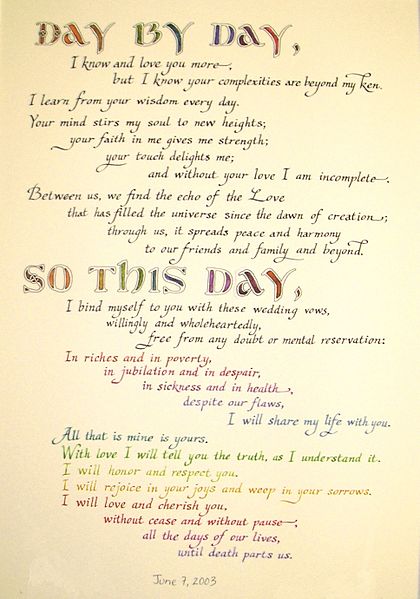In the time I’ve waited for Matthew (and to marry him), I’ve learned more about keeping wedding vows than when I was married previously. Obviously, being married previously means I’ve learned all this by trial and error, because waiting leaves much to be desired. It’s the worse in the “for better or worse”. It’s lonely and challenging to wait, and it supplies plenty of excuses to let go of the vows and move on.
Recently, one of the guys who attends services at the prison chapel shared with me that his wife was seeing another man. She told him she loved him and wanted to be there for him when he came home, but that she was just seeing this other man until then. (I could write a couple of pages of what is wrong with that thinking and it really makes me want too!)
In this specific case, you have a man who obviously didn’t keep his vows to end up in prison and you have a woman intentionally allowing another man into their marriage under the false illusion she can have both.
I believe it takes both husband and wife keeping their vows to make a marriage work. Vows are said by both during the ceremony, and they are to be lived out and upheld by both. I also believe forgetting the vows we spoke is the start to not keeping them. How can we keep something we don’t hold (know)?
This is the covenant we’ve agreed to. Have you just read the words in the vows to really grasp all they say?
Marriage Vows:
“Will you love and comfort her, honor and keep her, in sickness and in health, and forsaking all others, keep yourself only unto her as long as you both shall live?
To have and to hold from this day forward, for better or for worse, for richer or for poorer, in sickness and in health, to love and to cherish, as long as we both shall live.”
Let’s break it down:
“Will you love” – Even the first three words are impossible for us without Jesus. There are all kinds of versions of love out there. There are all kinds of definitions of love. But how good are these other versions and definitions? The divorce rate seems to indicate they aren’t very good. 1 Corinthians 13 is the way of love and the way of life-long marriage.
Love, Comfort, Honor, and Keep: In sickness and in health
Comforting our spouse, in sickness and health; to sooth pains, to provide them a place of solace in our hearts and arms.
Honoring is to respect, it is to make our spouse distinctly different in our hearts and minds from anyone else, it is to grant them privileges with you others don’t have/aren’t supposed to have.
Forsaking all others: Keep yourself only to her, for as long as you both shall live.
To not look for someone else, to not flirt, to not desire anyone else in a sexual way…this involves the self-control the bible teaches us we are to have…casting down the thoughts right when they happen so that we aren’t thrown off course in this area.
To Have and To Hold: For better for worse; For richer for poorer; In sickness and in health.
To hold onto each other through the good and bad times. There will be both in this life and we are to be partners through it all. To have and hold is to not let go of our spouse in the storms of life. Storms, disagreements, rough times, bad times, and sicknesses happen, but they don’t mean your marriage is over. It doesn’t mean your vows can now be forgotten.
To Love and Cherish: As long as you both shall live.
Love is in the beginning and in the end of our vows. Love is the beginning and end of the Bible, and our life with God. Whatever we have in our life and marriage start with or without love – whatever we start with we may very well end up with.
I see keeping vows as coming down to (Galatians 6); by either living by the Spirit of God or by the Flesh. If we live by the Spirit: guided and lead to live according to biblical principles of putting Christ first, learning to really love, learning how to forgive, and being made whole – we will reap life (in our marriage). But if we live by the flesh: giving up on our spouses, unable to forgive them, being angry, letting resentments in, selfishly expecting marriage to be all about our self and only our own needs – we will reap death (in our marriage.).
In a message I heard on the marriage vows, a great idea was given: keep them ever before you.
Find ways to include them in your marriage: One example was that he spelled out part of the vows to his wife in small pine cones on the front stoop so as she came outside she’d see it.
My thought was to slip notes containing part of the vows inside his lunch. The point is to remind each other of the vows you agreed to and really live them out. Look for fun ways to intentionally practice living each of the parts of the vows, and be intentional to stick to it in the hard times.
Reversing the rate of divorce comes down to our intentions. Do we aim to lovingly live out our vows or do we aim to stick to self?
